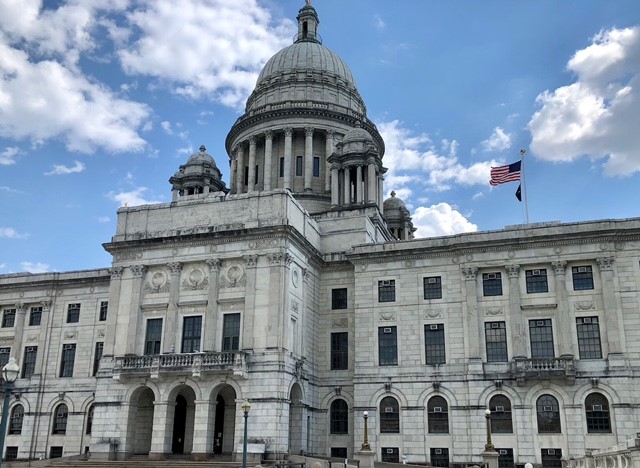
PROVIDENCE – The House Committee on Finance approved a $13.1 billion budget for fiscal 2022 late Thursday night that creates a business tax on forgivable Paycheck Protection Program loans above $250,000 but does not include proposals to increase taxes on high-wage earners.
The budget, which now moves to the full House, was approved by a 12-3 vote. It is nearly $2 billion more that was proposed by Gov. Daniel J. McKee.
House Speaker K. Joseph Shekarchi said the bulk of the increase in the House spending plan will come from federal stimulus funding, and an increase of $180 million in general revenue. He also noted that $300 million will go toward funding unemployment insurance, while $600 million will go to funding the state’s schools.
Shekarchi said that a top priority for the legislature is the affordable housing issue facing the state. The House budget includes a new surcharge on real estate sales over $700,000 to pay for affordable housing and also creates a position of state housing czar.
“This is a very serious problem, and we need to address it,” he said. “It was a priority in the Senate too. It’s an economic development problem.”
The new PPP tax, which business groups strongly oppose, will raise $40 million in two fiscal years, 2021 and 2022. Shekarchi said the bulk of the revenue will be derived from the 2022 tax year, but he did not provide a number in a media briefing before the vote. The PPP taxation is designed to tax 7% of the state’s businesses that received PPP loans.
Shekarchi said the budget doesn’t include proposals to increase the state’s top income tax rate from 5.99% to 8.99% on income over $475,000 or to tax sugary beverages.
The House’s budget also does not include funding for the R.I. Department of Health’s requested new laboratory space. RIDOH is seeking $82 million for the new facility. Shekarchi said he would like there to be a public process, including hearings and a study to determine the best path for the project.
Since March, the state legislature has had to shift from addressing the needs of a pandemic-induced revenue crisis to being the benefactor of $1.1 billion in federal stimulus aid from the American Rescue Plan, and a budget surplus of $416 million. The lack of federal guidance on how to utilize the stimulus funds has created delays for the legislature in passing some legislation.
The uncertainty it creates for state lawmakers could lead to some pieces of legislation being considered after the June 30 deadline, when the legislative session ends, to a summer or fall legislative session.
Shekarchi said that no hard commitments have been made regarding the allocation of the state’s $1.1 billion in ARP stimulus funds.
That uncertainty also applies to the governor’s proposal to legalize recreational marijuana, which lawmakers are still debating and was not included in the budget.
When McKee submitted his fiscal year 2022 budget proposal in March it came with a focus on addressing two economic priorities: Response to the pandemic and economic recovery aimed at aiding small businesses.
The governor’s budget plan represented his administration’s focus on handling its pandemic response, expanding the access to mental health services, equity, and social justice reform, promoting small businesses and economic growth, and improving equity in education.
On Wednesday, state leaders said the budget would help equip about 1,700 police officers across the state with body-worn cameras over the next 12 to 18 months at an implementation cost of $3 million, with an annual maintenance cost of $3 million for a five-year implementation period.
Other notable items in the budget include:
- Funding the R.I. Promise program at $7.7 million, hereby making the higher education program permanent. The program provides two years of free tuition at the Community College of Rhode Island to qualifying high school students in the state.
- Budgeting $22.5 million from general revenue to finance the Rebuild RI Tax Credit program, while raising the program cap from $210 million to $240 million to ensure it continues to stimulate business development, retention, and attraction, and create well-paying jobs in fiscal year 2022.
- Funding the Motor Vehicle Excise Tax phase-out in fiscal 2022, to be financed with $139.7 million in general revenue. Under current law, the Motor Vehicle Excise Tax would be eliminated in fiscal 2024.
- Eliminating the annual $10 sales tax permit fee paid by businesses who conduct retail sales, saving businesses across the state an estimated $331,585 in fiscal 2022.
- Providing $3 million for the Real Jobs RI workforce development program.
- Funding the K-12 school system at the funding formula level, increasing the state’s aid to school districts by $34.9 million without raising taxes; while committing approximately $6 million to incentivize childcare providers to offer quality care; and appropriating $200,000 to create a Child Care Assistance Program pilot to assist working parents who are pursuing higher education.
- Allocating an additional $847,000 to the Medication-Assisted Treatment program to offer it on the night of commitment to people whose stays in the Adult Correctional Institutions may not be long enough to support traditional induction into the program.
- And financing the Distressed Communities Relief Program at $12.4 million in general revenue in fiscal 2022.
(UPDATES throughout to include committee vote, MINOR edits.)
Cassius Shuman is a PBN staff writer. Contact him at Shuman@PBN.com.










